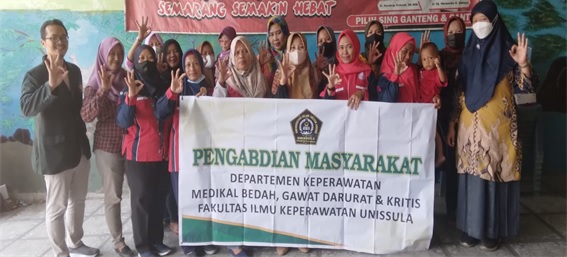Pelatihan Brief Psychoeducation bagi Kader Warga Peduli AIDS (WPA) Genuksari dalam Mengurangi Stigma Masyarakat terhadap Orang dengan Human Immunodeficiency Virus (ODHIV) Brief Psychoeducation Training for Warga Peduli AIDS (WPA) Genuksari Cadres in Reducing Community Stigma among People Living With Human Immunodeficiency Virus (PLHIV)
Main Article Content
Abstract
Stigma in PLHIV is often shown by social rejection, lack of recognition, and discrimination that will cause shame and fear for PLHIV to interact with others. HIV-positive status can lead to a lack of social support, lead to depression, loss of opportunities to work and earn income, and decreased courage to seek medical services. Residents Concerned about AIDS (WPA) of Genuksari Village are one of the PLHIV support groups that have the potential to reduce community stigma. One of the efforts to increase the ability of WPA Genuksari members is to assist. In this assistance, efforts will be made to screen HIV risk in healthy communities, screen stigma in the community, and increase the ability to overcome community stigma through brief psychoeducation.
Downloads
Article Details

This work is licensed under a Creative Commons Attribution-ShareAlike 4.0 International License.
Authors who publish with this journal agree to the following terms:
- Any article on the copyright is retained by the author(s).
- Author grant the journal, right of first publication with the work simultaneously licensed under a Creative Commons Attribution License that allows others to share work with acknowledgment of the work authors and initial publications in this journal.
- Authors are able to enter into a separate, additional contractual arrangements for non-exclusive distribution of published articles of work (eg, post-institutional repository) or publish it in a book, with acknowledgment of its initial publication in this journal.
- Authors are permitted and encouraged to post their work online (e.g., in institutional repositories or on their websites) prior to and during the submission process, as can lead to productive exchanges, as well as earlier and greater citation of published work.
- The article and any associated published material is distributed under the Creative Commons Attribution-ShareAlike 4.0 International License
References
Alfianto, A. G., Apriyanto, F., & Diana, M. (2019). Pengaruh Psikoedukasi Terhadap Tingkat Pengetahuan Tentang Stigma Gangguan Jiwa. JI-KES (Jurnal Ilmu Kesehatan), 2(2), 37–41. https://doi.org/10.33006/ji-kes.v2i2.117
Amal, A. I. & Khofsoh, E. (2018). Potret Kebutuhan Spiritual Pasien HIV/AIDS. Proceeding Unissula Nursing Conference, 1(1), 70–74. http://dx.doi.org/10.26532/.v1i1.2889
Aryani, L., & Pramitasari, R. (2018). Perkembangan Kasus HIV Di Kota Semarang : Tinjauan Karakteristik Dan Aspek Lingkungan. Jurnal Kesehatan Masyarakat Indonesia, 13(1), 7–12.
Balatif, R. (2020). Pelajari HIV, Hentikan Stigma Dan Diskriminasi Orang Dengan HIV/AIDS (ODHA). JIMKI : Jurnal Ilmiah Mahasiswa Kedokteran Indonesia, 7(2), 125-129. https://doi.org/10.53366/jimki.v7i2.52
Jannah, R. & Sumiatin, T. (2022). Empowerment Of Family In Treating Odgj (Persons With Mental Disorders) At Home Through Psycoeducation And Assistance As An Effort Relapse Prevention. Jurnal Pengabdian Masyarakat Kesehatan, 8(3), 204-213. https://doi.org/10.33023/jpm.v8i3.1236
Krisdayanti, E. & Hutasoit, J. I. (2019). Pengaruh Coping Strategies terhadap Kesehatan Mental dan Kualitas Hidup Penderita HIV/AIDS positif. Jurnal Ilmu Keperawatan Jiwa, 2(3), 179-184. https://doi.org/10.32584/jikj.v2i3.440
Masturi, A. (2010). Membangun Relasi Sosial Melalui Komunikasi Empatik (Perspektif Psikologi Komunikasi). KOMUNIKA: Jurnal Dakwah dan Komunikasi, 4(1), 14–31. https://doi.org/10.24090/komunika.v4i1.135
Rifai, A. (2016). Brief psychoeducation intervention against HIV/AIDS related stigma among house wifes lived in coffee plantation area. Jurnal Keperawatan Muhammadiyah, 1(2), 1-7.
Shaluhiyah, Z., Musthofa, S. B., & Widjanarko, B. (2015). Stigma Masyarakat terhadap Orang dengan HIV/AIDS. Kesmas: National Public Health Journal, 9(4), 333-339. https://doi.org/10.21109/kesmas.v9i4.740
Widayati, N. & Murtaqib. (2016). Identifikasi Status Psikologis Sebagai Upaya Pengembangan Model Rehabilitasi Klien HIV/AIDS Berbasis Komunitas. Nurseline Journal, 1(1), 90–99.
